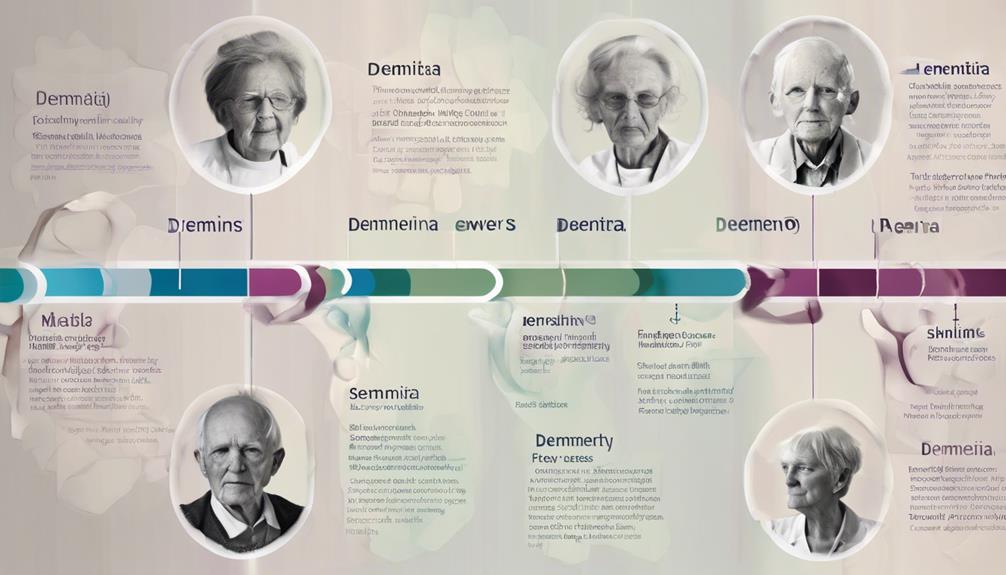When exploring the extensive realm of palliative care for those with dementia, successfully navigating through the intricate journey calls for a combination of a solid comprehension and a compassionate heart.
Understanding the nuances of providing care for individuals with dementia can be likened to unraveling a tapestry of interconnected threads, each representing a different facet of their well-being.
However, as you begin to explore this intricate process, you'll uncover key insights that shed light on how to enhance the quality of life for those facing dementia.
Key Takeaways
- Specialist palliative care is crucial for dementia patients throughout their journey.
- Advance care planning must be initiated early to ensure preferences are respected.
- Recognizing symptoms signaling the end stages is essential for appropriate care.
- Cultural and spiritual needs must be addressed to provide holistic support.
Dementia Patients' Palliative Care Overview
In providing palliative care for dementia patients, the focus lies on enhancing their quality of life, managing symptoms effectively, and offering vital emotional and spiritual support. When caring for individuals with dementia, it's essential to address their complex needs early in the journey.
This holistic approach involves a multidisciplinary team comprising doctors, nurses, social workers, and chaplains. Advance care planning plays a pivotal role in ensuring that the patients' end-of-life wishes are understood and respected throughout the care process. Coordinated care and open communication among healthcare professionals are crucial elements in guaranteeing the comfort and well-being of dementia patients as they navigate this challenging phase.
As you embark on the palliative care journey with dementia patients, remember that your role in providing compassionate care, managing symptoms, and facilitating discussions about advance care planning is invaluable. By working collaboratively as part of a multidisciplinary team, you can make a significant difference in enhancing the quality of life for these individuals and supporting their end-of-life wishes with empathy and understanding.
Types and Symptoms of Dementia

Dementia presents a spectrum of cognitive impairments and behavioral changes that significantly impact individuals' daily lives. Alzheimer's disease, the most common type, leads to memory loss, confusion, and behavioral shifts. Vascular dementia, caused by reduced blood flow to the brain, also results in cognitive decline and mobility issues.
Lewy body dementia is identified by abnormal protein deposits affecting thinking, movement, and behavior. Frontotemporal dementia primarily impacts behavior, language, and personality due to nerve cell damage in the brain. Each type of dementia brings its unique challenges, from the gradual memory loss in Alzheimer's to the sudden behavior changes in frontotemporal dementia.
Understanding these distinctions is crucial for providing tailored care and support to individuals with dementia. By recognizing the symptoms associated with each type, caregivers can offer targeted assistance to enhance the quality of life for those navigating the complexities of dementia.
Progression of Dementia Symptoms
Navigating the journey of dementia with a loved one involves observing the progression of symptoms as they evolve from early memory difficulties to cognitive challenges, mood changes, and personality alterations. As dementia advances to the late stages, individuals may exhibit limited speech, withdrawal, decreased food intake, and loss of mobility. Weight loss often becomes a concern due to swallowing issues that can arise with the progression of dementia. Recognizing signs of death in advanced dementia is crucial, with rapid deterioration, loss of consciousness, swallowing difficulties, and irregular breathing indicating the proximity to the end of life.
During this challenging time, involving healthcare professionals such as GPs, nurses, and social workers is essential. These professionals can provide valuable support and guidance to both the individual with dementia and their caregivers. Understanding the symptoms and changes that occur as dementia progresses can help in preparing for the care needed in the late stages of the disease. Stay connected with the healthcare team to ensure the best possible care for your loved one as they navigate advanced dementia.
End-of-Life Care Considerations

As your loved one reaches the advanced stages of dementia, thoughtful consideration of end-of-life care becomes increasingly important to ensure their comfort and dignity. Specialist palliative care plays a crucial role in addressing the specific needs of dementia patients nearing the end of life. Advance care planning becomes essential to outline preferences and ensure that decisions align with the individual's wishes.
Communication strategies, such as utilizing non-verbal cues, music, and other personalized approaches, are effective in providing comfort during this sensitive time.
Recognizing symptoms that indicate proximity to death in dementia patients is vital, as these signs may persist for months, requiring specialized support from healthcare professionals. Effective communication, regular contact, and identifying cultural and spiritual needs are key components in delivering person-centered end-of-life care. By addressing these aspects thoughtfully and compassionately, you can help ensure that your loved one's final days are as comfortable and dignified as possible.
Supporting Dementia Patients' Caregivers
Supporting caregivers of individuals with dementia can significantly alleviate the stress and strain associated with the demanding nature of caregiving. Caregivers play a crucial role in the well-being of dementia patients, and providing them with respite care can offer essential relief. Respite care allows caregivers to take a break, recharge, and continue providing care at home for longer periods.
Transition discussions to residential care might become necessary to ensure the patient's safety and quality of life, and involving caregivers in these conversations is vital. District nursing services working in collaboration with palliative care services offer valuable support to individuals with advanced dementia at home. Recognizing specific decline signs and using assessment scales can guide referrals to specialist palliative care, enhancing the overall quality of care for dementia patients.
Frequently Asked Questions
How Long Can Someone With Dementia Be in Palliative Care?
You can receive palliative care for dementia for varying lengths of time, depending on your needs and disease progression. Some individuals may need ongoing support for years, while others may require it for a shorter period.
Factors like the stage of dementia, symptom management needs, and overall health status influence how long you may be in palliative care. The focus is on improving your quality of life, addressing symptoms, and providing personalized support as your needs evolve.
How Long Does End Stage Dementia Usually Last?
End-stage dementia typically lasts from a few weeks to several years. It varies greatly based on individual factors like overall health, age, and type of dementia.
During this stage, there's severe cognitive decline, loss of physical function, and increased vulnerability to infections. Care focuses on comfort, symptom management, and support for both the individual and their caregivers.
What Are the Final Stages of Mixed Dementia?
In the final stages of mixed dementia, severe cognitive decline occurs, impacting memory, language, and decision-making abilities. You may notice increased confusion, disorientation, and difficulty recognizing loved ones.
Mobility issues become pronounced, leading to limited movement, dependence on others for daily activities, and a higher risk of falls.
Behavioral changes like agitation, aggression, and apathy can intensify, affecting interactions and care management. This stage is characterized by a significant decline in overall function and increased vulnerability to infections.
What Does Palliative Care Do for Dementia Patients?
Palliative care for dementia patients focuses on improving quality of life, managing symptoms, and providing emotional and spiritual support. It helps address pain, discomfort, and behavioral changes associated with dementia progression, reducing caregiver burden and supporting families.
The goal is to enhance overall well-being and comfort at all stages of the disease. This care involves a team of medical professionals to ensure comprehensive support for patients and their loved ones.
Conclusion
In the challenging journey of palliative care for dementia patients, understanding the types and progression of symptoms is crucial.
Providing end-of-life care with compassion and support for caregivers is essential.
Remember, patience and perseverance pave the path to peace in the process.
Stay strong, stay steady, and stay supportive in the long palliative care process for dementia patients.









